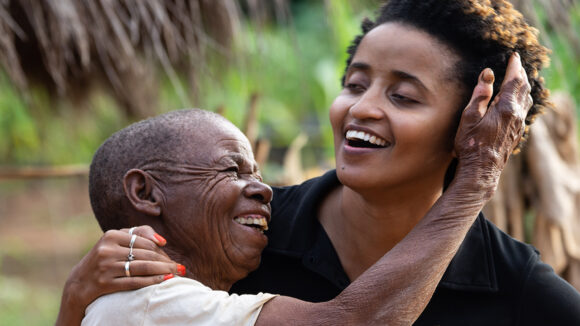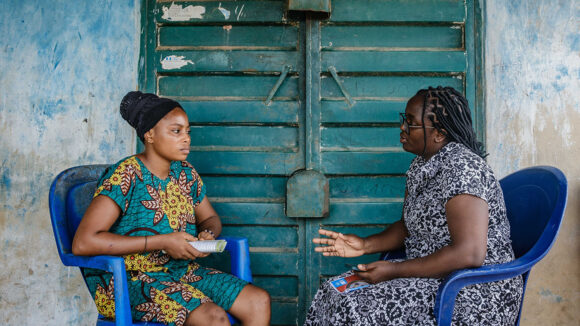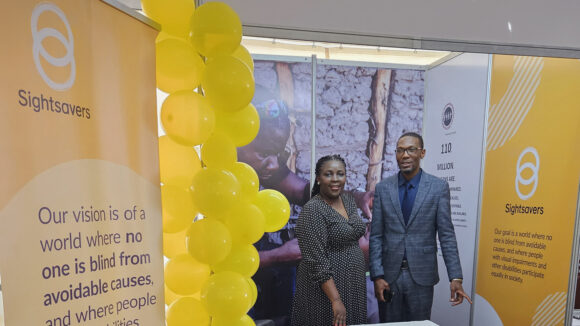Women’s rights are human rights, but millions of women worldwide cannot access the health services they require, and this prevents them from participating fully in society.
A lot of the statistics are stark. For example, women with disabilities are three times less likely to get the health care they need, when compared to men without disabilities. Women and girls with disabilities have also been consistently neglected in sexual and reproductive health policies and programmes.
When it comes to eye care, women have poorer access to services than men, and are more likely to be blind or have a visual impairment. Without action, women will continue to go blind in greater numbers than men.
That’s why on International Women’s Day, on 8 March, we’re calling for health care to be accessible and disability-inclusive for women and girls.
What we’re doing
Sightsavers works with partners across Africa and Asia to challenge negative stereotypes, dismantle the barriers that stop women and girls from accessing health care, and develop programmes in collaboration with women’s organisations to ensure equity and address gender-specific issues.
Social, cultural and geographical barriers women face in many countries include a lack of decision-making power and financial independence, as well as traditional roles and caregiving requirements that make it challenging for women to seek care.
This International Women’s Day, Sightsavers is launching ‘A Woman’s Place’ to help raise awareness about some of the challenges faced by women, celebrate the individuals who are making an impact and call for further collective action to make healthcare more inclusive. We chose to use the phrase ‘A Woman’s Place’ to help subvert and challenge some of the stereotypes about women and girls because we believe that a woman’s place should be wherever she wants it to be.

Partner with us
Sightsavers is the partner of choice to help your organisation and programmes meaningfully engage women and girls.
Email Anna Becker, director of institutional fundraising
What it means
When we support one woman, it can create a ripple effect that impacts her life, her family and her community, now and in the future.
During my career at Sightsavers, I have seen first-hand the impact of our commitment to making health care inclusive for all and I’ve had the opportunity to learn from fantastic colleagues and partners such as Joy who leads on some of our work in Nigeria, including our trachoma elimination and sexual health programmes.
She shared: “A story that comes to mind is of a young entrepreneur from the northern part of Nigeria. She had trachoma and because of her painful symptoms, she was not able to do her job. We were able to reach her with surgery and this changed her life drastically. She was able to return to work and provide for her family. It’s stories like this that motivate us to keep working because it made a lifetime of difference. Not just for her, but also for her family.”
At Sightsavers, we’re committed to making sure the voices of women, particularly women with disabilities, are heard at every stage of our programme planning, and we’ll continue to call for change. By working collaboratively to make sure everyone can access the health care they need, we’re making progress towards achieving universal health coverage and the UN Sustainable Development Goals, and creating a more equal world.
As my colleague Sumrana puts it: “Collective action is what we need. Collective action to change this world for our girls and women. And we need to be in this together.”
Author
 Rebecca Mintrim is a communications strategist at Sightsavers.
Rebecca Mintrim is a communications strategist at Sightsavers.
Want to learn more about our work?
About SightsaversMore blogs

Why community collaboration is important in our research
Our research on female genital schistosomiasis has highlighted the need to establish a safe and supportive environment for participants when studying sensitive topics.

The key to inclusive education is engaging organisations of people with disabilities
Collaborating with organisations of people with disabilities (OPDs) on our inclusive education projects has earned the Sightsavers-led Inclusive Futures consortium a Zero Project Award in 2024.

Six takeaways from the International Conference for Public Health in Africa
Sightsavers’ Hortance Manjo shares insights from the event in Zambia, which highlighted eye health for the first time.